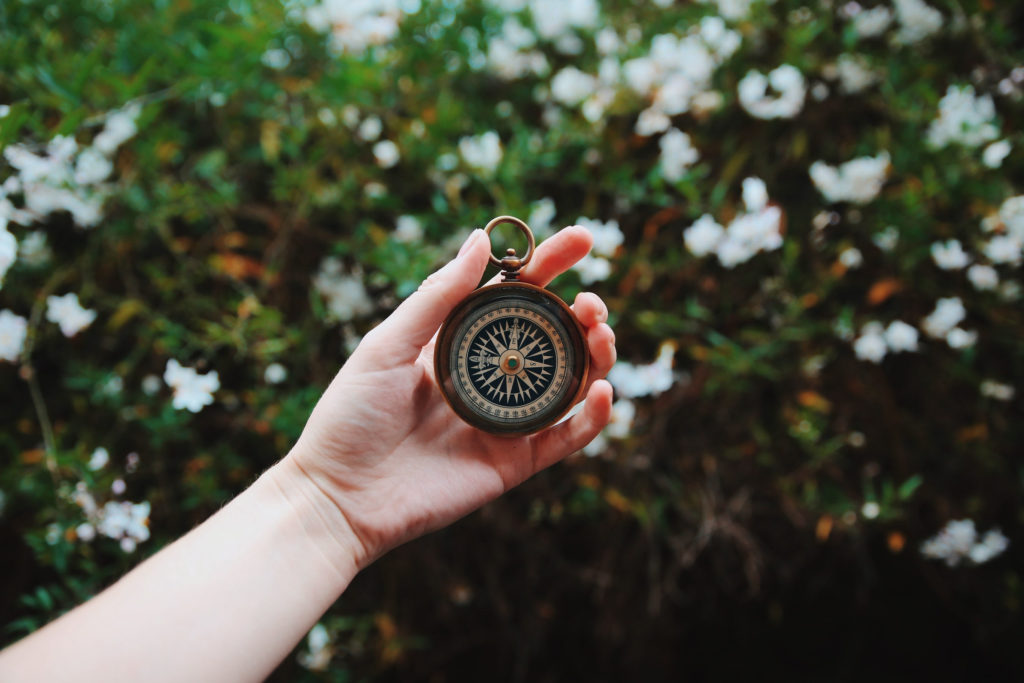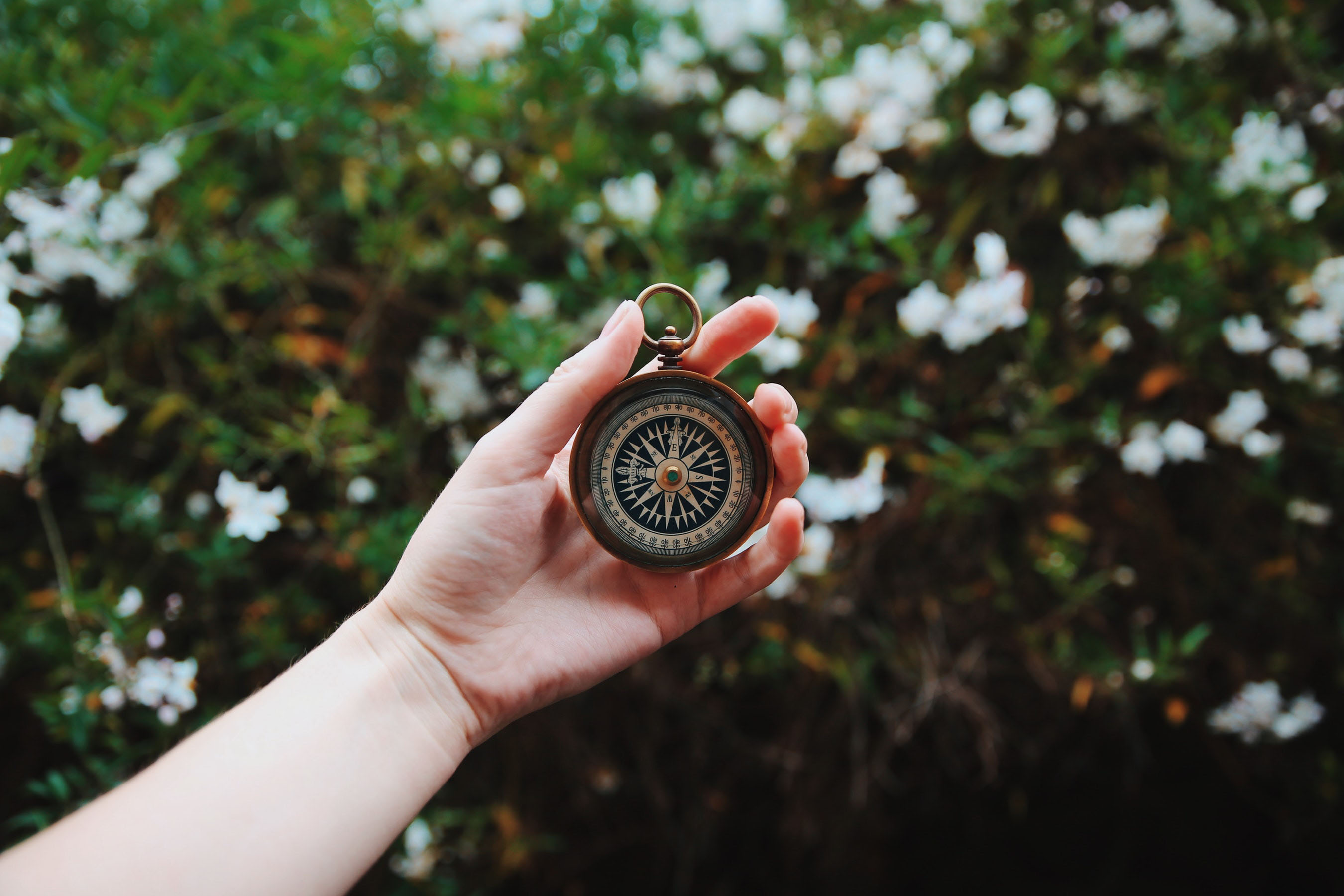
“I’m guided by a signal in the heavens.”
(from Leonard Cohen’s “First We Take Manhattan”)
Early Guides
The etymology of the word “guide,” both noun and verb, is the late 14th c. Old French guidar “to guide, lead, conduct,” from the Frankish witan or “show the way,” and the Proto-Germanic witanan or “to look after, guard.”1 So guidance in many myths and traditions involves someone or something (a power, a presence, a god, God, Spirit) leading a seeker on a path. The word “guidance” is often tied mythically to the underlying archetype of the journey.
By being born, we all find ourselves on a journey of some kind. For me, books, rather than human or supernatural presences, were my original and primal guides. When I was about four, my aunt, a socialist schoolteacher, stored her collection of fairy tales and children’s anthologies in our family’s basement. Even before attending school, I would sneak down to clasp the curious volumes in my hands, inhale their musty fragrance, and study the enchanting illuminations that accompanied the then indecipherable texts. When I began to read, I started carrying a volume or two at a time to my room where I would lie buried under the covers with a flashlight, following the trail of one nursery rhyme, story, myth, or poem after another. My literary companions conducted me on a journey as surely as would any living-breathing guide. While casting my eyes over the symbols on the pages, I communed with the minds, hearts, and spirits of others from imaginal places, both human characters, animals, and spirit beings. Before I knew anything about the poet William Blake, for instance, the rhythm of his short lyric “Infant Joy” from Songs of Innocence in Journeys Through Bookland pulsed through my body.2 The My Bookhouse series led me through Mother Goose, Grimm’s and Anderson’s fairy tales, and on to short excerpts from Homer, the European classics, and fragments of Eastern literature.3
Before too long, human guides began to manifest. My grade seven English teacher, Mr. Donald Lemieux, became my first human “guide” outside the family, the one who set my feet on the poetry path. As an introspective, intensely self-conscious pre-teen, I was surprised when Mr. Lemieux cast me in the role of one of the witches in a classroom enactment of the opening scene from Macbeth. Hurling out the feisty chant, “Double, double, toil and trouble,” I became momentarily one of the “weird sisters” and completely let go into another persona.
Later, Mr. Lemieux assigned the class the task of composing an original poem. In fear and trembling, I presented him with one of my closet efforts. After taking my word that I had not copied it from a book, he scratched his chin and suggested: “Would you like to take on the role of literary editor of our student newspaper? All you have to do is collect poems from other students, add some of your own pieces, and paste them into a few columns.” Some of us ran off sheets of paper on a mimeograph machine, stapled them together, and distributed them in the hallways. Though my role seemed small, Mr. Lemieux was the first to offer me an identity as a poet, a writer. Successive poetry mentors appeared: Robin Blaser, who supervised my MA thesis at Simon Fraser University (1969-1973), and P.K. Page, who chose a sequence of my poems on William Blake as the first-place winner of a chapbook contest in 1997.4 These guides seemed to appear in my life precisely when I most needed them.
Looking back, I feel I have been drawn to certain people who have been drawn to me in a timely way essential to my development, and in response to an unspoken need. I feel these encounters have not been due merely to luck, or entirely random. After discovering concepts of pre-existence and reincarnation, I wondered if I might have had some involvement in choosing these pivotal helpers before my birth. In each instance, I found myself astonished that somehow, despite all my mistakes and imperfections, I ended up precisely where I was supposed to be at exactly the right time.
Guidance and Free Will
Guidance has presented in my life as gentle, non-coercive. It is not a violation of my free will, and does not imply a patriarchal God or a deterministic worldview. Somehow, I am engaged in the choices as well as the outcomes, though not their prime mover. It seems as if I occasionally, unaccountably join my will and identity with something larger, a gracious love field moving in and through both me and the world. Guidance relates to being fully alive, to being surprised by meaning. Not only do I feel called to create, but to co-create or participate in the flow of an intelligent energy and presence that is at some level my innermost core and yet deeply other. Talking to others about guidance has validated my sense that such epiphanies are universal, but also that we cannot induce or command them.

My Years with Olga
I most attribute this continuing sense of guidance to a life-changing relationship with Olga Park (1891-1985), a modern Canadian mystic I met in September of 1969 when I was twenty-two. Olga was living in a tiny cottage in Port Moody, British Columbia at the time. After our first encounter, I began to study with her, and continued to be her learner until her death sixteen years later. More recently, I have written a spiritual memoir, Into the Mystic: My Years with Olga, where I reflect on not only those formative years, but on the ongoing legacy of Olga’s presence in my life.5
As my central spiritual teacher and guide, she remains unsurpassed. The first thing she said to me was that anyone who establishes a regular practice of contemplation, meditation, or prayer will eventually receive “healing, comfort, and guidance from within,” and that it is indeed appropriate to ask for these things. She also believed that guidance is universal, but that receptivity and a strong desire of the heart may accelerate the universe’s responsiveness. Experiencing guidance does not mean one escapes pain, suffering, and loss, but that these experiences are gathered up in a larger whole where love has the final say.
Ever since meeting Olga when she was seventy-eight, I have been engaged with the living archetype of the guide and divine guidance. In 1969, Olga was the elder, the wise crone. Now at the age of seventy, the “signal from the heavens” hints it is my turn to step into elderdom, to allow the universe to shape me into a small, imperfect embodiment of the wisdom I sought so intensely when I was on the cusp of adulthood. One thing is clear: the purpose of learning from Olga was to help me connect with my own interior guidance, not to make me dependent on her.
Companions of the Way
Another human encounter that seems guided was that of meeting and establishing a partnership with my husband of going on forty years. I do not believe our compatibility means we are especially privileged or mature, but that we have somehow entered a continuous conversation that is never boring or finished. Though very different from one another, we have developed side by side without intruding on each other’s individuality. We have become what Olga spoke of as “Companions of the Way.”
We became best friends for several years before deciding to conjoin our lives. Though he was a younger man who had lived and breathed the wilderness from early childhood, and I, nine and a half years older and more drawn to books and the cultural amenities of the city, we soon discovered we had developed rich, parallel interior lives. After we decided to get married, he shared one of his visions. In a dream that seemed much more intense than ordinary ones, he found himself on the narrow street of a 17th-century town somewhere in France. He was a novice intent on taking his vows as a monk. I was a postulant preparing to become a nun in a house of a Catholic religious order. We had met previously, but did not know each other well. As he passed the religious house where I was living, his gaze was drawn to a second-story window where I stood manipulating in my hands a heavy silver cross inlaid with turquoise. I shifted the cross so that it caught the rays of the sun, directing them onto his head. Immediately, he stepped through the doorway of the house, ascended a flight of stairs, and opened the door of a room where he found me lying prostrate on the bed weeping. I did not speak, but he felt an intense heaviness enveloping us both. He knew he was not allowed to remain on the premises, so withdrew. Later, when revisiting the dream, he indicated he felt we had desired to be together at that time, but were prevented because of the strictures of the church. Through this and other such experiences, we came to feel that, although we were unable to unite in previous lives, somehow in this lifetime we have been blessed with both marriage and a child.
Decades later in 2013, when I spent three months in Aix-en-Provence with our grown daughter, I stumbled on a small hotel that had earlier been a convent run by the Augustinians, and immediately felt it was the religious house my husband experienced in his dream. The window, the balcony, the street, and the architecture had an uncanny aura of being a place where I had once lived. Though past life regressions are difficult to validate empirically, we are convinced there is more to individuality than can be explained by who we seem to be based on a single lifetime. As young people both from Christian backgrounds, we knew that reincarnation was considered heretical by most Christian churches. But as I did more research, I discovered some scholars argue that before the forging of the doctrines of the early church, as established by the Nicaean Council (325 AD), and even at the time of Jesus, reincarnation was a widely-held belief in the Middle East. It was taught by Pythagoras, Plato, the theologian Origen of Alexandria, pre-Christian and Christian Gnostic groups, and within esoteric Christian communities, so is not exclusive to eastern religious constructs.6 Olga, who became my husband’s mentor as well as mine, experienced continual direct contact with the life-beyond-death, and taught both the pre-existence of the soul and the survival of consciousness after death. However, Olga warned us of the dangers of getting lost in interest in past lives, and the importance of living in the present.
The notion of individuals having some form of pre-existence came to our attention when I had a powerful dream in my early twenties of giving birth to a blue-eyed child. This proved to be so, but not until I was almost forty, two years after Olga’s death. In the early stages of my pregnancy, my husband dreamed that a blonde, blue-eyed girl of about two or three came running up to him in a mall, pulled back the newspaper he was reading and excitedly asked: “Are you my daddy? My mommy and I are looking for my daddy.” Such experiences as these made us wonder if children do not sometimes have a role in choosing their parents.

Guidance and Inner Knowing
The psychologist William James argues in The Varieties of Religious Experience (1902) that direct mystical experiences are not only diverse, but universal. They possess what he calls a “noetic quality”:
Although so similar to states of feeling, mystical states seem to those who experience them to be also states of knowledge. They are states of insight into depths of truth unplumbed by the discursive intellect. They are illuminations, revelations, full of significance and importance, all inarticulate though they remain; and as a rule they carry with them a curious sense of authority for after-time.7
Certainly, a “gnosis” involving spiritual guidance is present in many world religions and spiritual traditions. For example, First Nations myths and stories refer to non-human guides, many of whom appear in the form of animals like Wolf, Eagle, Deer, Bear, Raven or Coyote. Celtic mythology is shamanic in its origins, replete with tales of beings from the liminal “Otherworld.” My Irish grandmother introduced me as a child to the magic of the world of faery, the interior dimensionality of nature. For her, trees were sentient beings, elders to be regarded with respect, and to whom we could go for refuge and help. Her stories of the “wee folk” who lived in the roots and branches of the trees transported me to the borderlands between our subjectivity and those larger worlds.
Guidance and the Way
In the three monotheistic religions of the west, Judaism, Christianity, and Islam, guidance is present in the metaphor of life as a journey or way. When struggling on the path that leads through the wilderness, the Israelites encountered angels, helpers, prophets and wisdom teachers. Each monotheistic religion has its mystical streams: in Judaism, the Kabbalah; in Christianity, the European mystics like John of the Cross and Teresa of Avila; and in Islam, Sufism and mystical poets like Rumi and Hafiz, to name only a few.
In a recent volume of poetry consisting of a series of Persian-style couplets or ghazals, Two Minds (Frontenac, 2015), poet Harold Rhenisch places at the very heart of his book the Islamic prophet al-Khiḍr or Khezr, the Sufic Green Man. He writes that Khezr “is one of the afrad, the Unique Ones who receive illumination directly from God without human mediation; they can initiate seekers who belong to no Order or have no human guide; they rescue lost wanderers and desperate lovers in the hour of need.”8 While on pilgrimage on the Northern Camino in Germany, Rhenish discovered that Khezr had become his interior guide.9 What Rhenisch’s poems suggest is that sometimes we do not find the guide, but the guide finds us. Perhaps that guide is our own deepest self, our higher self in union with the mind and creative intelligence of the universe.
As a person drawn to both eastern and western mystical paths, guidance for me involves awakening to the epiphanies occurring within and around us all the time, but of which we are not always aware. The preconditions for being at one with inner guidance are receptivity and attention.
Some Caveats About Guidance
The pitfalls of a false sense of guidance are legion. Putting faith in a God or spiritual realm entirely outside the world and the processes of nature sets up a binary not only between earth and heaven, time and eternity, but also between the guide and the guided. The metaphor of the way or road can be reduced to the belief that there is only one right way and that some of us know what it is and have the right to impose it on others. The Way then becomes merely a march through history determined by power structures driven by the human ego rather than a dynamic wisdom inherent in all things. How often have priests, ministers, or leaders of corrupt religious structures claimed to have been enacting God’s will for others, whether based in a literalistic interpretation of scripture or on their own private revelations? And often these “blind leaders of the blind” hold an absolute certainly about the truth of their revelations.
Belief in reincarnation can lead to smugness, since people who have what they consider a “fortunate birth” may believe they have earned their elite social status as well as the right to disregard the suffering of the less fortunate. If people think God or a divine power guides and rewards those who are “good,” serious problems arise. Why do some people pray and ask for guidance but seem to receive no answer, while others feel they have God’s special friendship and protection? Why should my life be guided and someone else’s not? Are the kids born with fetal alcohol syndrome or refugees born into war zones guided?
Many of these questions and assumptions spring from false concepts not inherent in an authentic sense of guidance. Yet the experience of guidance need not be tied to belief in a patriarchal God who controls the world from outside. Alfred North Whitehead, a twentieth-century process philosopher, argues that what many have called “God” is a creative intelligence present within the process of lived experience who creates, loves, and suffers within and beside us and things. This creative intelligence, akin to creative imagination, is alluring, lures us toward wholeness, but also dwells within the process itself. In Process and Reality Whitehead’s divine presence becomes “the poet of the world, with tender patience leading it by [his/her/their] vision of truth, beauty, and goodness.”10
Many people encounter several guides in a lifetime. My recently deceased friend Donald Grayston, a Canadian Thomas Merton scholar, playfully suggested his dog has been his “spiritual director,” and I have no reason to challenge that assumption. Yet a person need not seek an external guide to have a sense of interior guidance. Discovering one’s inner compass is a lifelong process. Interior guidance is available to everyone, and never merely the possession of a spiritual elite. We all “live, move, and have our being” in a larger force field.11
Extending Concepts of Guidance
What if the notion of guidance has been too narrowly focussed on the individual? What if guidance is a collective process as well as an individual one? If the individual is guided, then perhaps the larger cosmos is as well. The poet Dante implies as much at the end of his Paradiso where he speaks of “the Love that moves the sun and the other stars.”12 Mystics who speak of the microcosm indwelling the macrocosm and vice versa, locate our individuality within cosmic configurations. In this unified context, being guided means coming into alignment with the greater spheres. Responding to guidance involves engaging actively with a dynamic order that includes both randomness and order. Inclusive Being, God, Goddess, the gods, the divine, or whatever we wish to call the unnameable mysteries, constantly invites us to participate more fully in the processes of nature and a more inclusive reality.
Hoping to avoid the pitfalls of glibly expressing a sense of divine guidance, I continue to ask, knock, wait, and open. I continue to act out of faith that divine love and wisdom desire to move in and through nature, all life forms and species, the planet, the universe, and each of us despite the short-sightedness of our egoic self-will. Seeking guidance does not mean being naively positive, unresistant to injustice, but choosing to enter a state of receptive unknowing where an empowering love can emerge beyond all our definitions, explanations, and finalities. ♦
If you have enjoyed this piece, consider subscribing.
References:
1Online etymological dictionary: http://www.etymonline.com/index.php?term=guide.
2 Blake, William. “Infant Joy” in Journeys Through Bookland. Vol. 2. Ed. Charles H. Sylvester. Chicago: Bellows-Reeve Co., 1922): 10.
3My Bookhouse. Ed. Olive Beaupre Miller. Chicago: the Bookhouse for Children, 1920.
4McCaslin, Susan. Letters to William Blake. Salt Spring Island: Mother Tongue Press, 1997. This chapbook was produced on a handset press by Mona Fertig and Peter Haase. It was published subsequently in McCaslin’s volume of poetry, The Altering Eye (Ottawa, Ontario: Borealis Press, 2000).
5McCaslin, Susan. Into the Mystic: My Years with Olga. Toronto: Inanna Publishing, 2014.
6MacGregor, Geddes. Reincarnation in Christianity. London, England: The Theosophical Publishing House, 1978.
7James, William. The Varieties of Religious Experience. Introd. Reinhold Niebuhr. London: Collier MacMillan Publishers, 1961: 300.
8Rhenisch, Harold. “Khezr, the Hidden Prophet, and my Two Minds.” http://haroldrhenisch.com/2015/10/06/khezr-the-hidden-prophet-and-my-two-minds/.
9Harold Rhenisch, “Khezr, the Hidden Prophet, and my Two Minds.” http://haroldrhenisch.com/2015/10/06/khezr-the-hidden-prophet-and-my-two-minds/.
10Whitehead, Alfred North. Process and Reality. Ed. David Ray Griffin. NY: The Free Press, 1978, Chapter II, IV.
11Acts 17: 28. Holy Bible: New Revised Standard Version. Grand Rapids, Michigan: Zondervan.
12Dante, The Divine Comedy: 3: Paradise. Trans. Dorothy L. Sayers and Barbara Reynolds. Baltimore, Maryland: Penguin:347. “High phantasy lost power and here broke off; / Yet as a wheel moves smoothly, free from jars,// My will and my desire were turned by love, / The love that moves the sun and the other stars.” (Canto xxxiii, 142-145).
